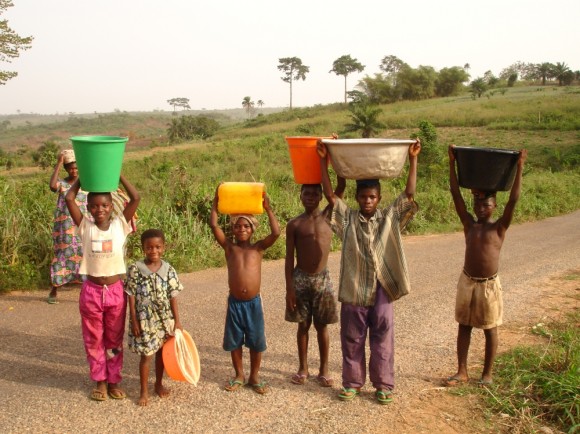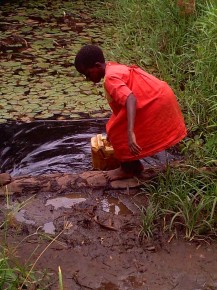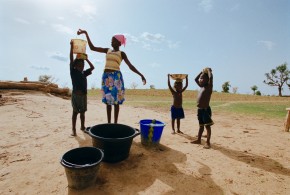
Earlier this month, the UN Secretary General announced that two billion people have gained access to safe drinking water in the last 20 years, and that the Millennium Development Goal target on water had been achieved five years early. The Secretary of State for International Development, Andrew Mitchell, described this achievement as "concrete proof that well spent aid can make a real difference to the lives of some of the very poorest". I couldn't agree with him more.
However, despite this success, 783 million people continue to live without clean drinking water. To put that figure into context, that's around one and a half times the population of the 27 countries within the European Union. But despite the scale of the challenge, getting water to every person on the planet is within our grasp and with the right political will and investment this could become a reality.
Living without safe water and sanitation often means an existence in chronic poverty. Life without these basic services is a burden carried literally by women and girls. What's more, contaminated water and poor sanitation kill more children in Africa than AIDS, malaria and measles combined, and together are the second biggest killer of children worldwide. There is much more the international community can do to tackle this crisis.

The wider impacts of lack of safe water to drink and sanitation are huge. Illness and the time spent walking miles to collect water keep children out of school, and prevent many women from earning a living. Girls drop out of school at puberty if there are no toilets available. Around half the hospital beds in developing countries are filled with people suffering from diseases associated with poor water, sanitation and hygiene. Money spent treating water-borne preventable diseases is holding back development.
The problem of safe sanitation is even greater than that of safe drinking water. 2.5 billion – over a third of the world's population – lack access to this vital amenity. It is one of the most off-track of all the Millennium Development Goals (MDGs).
One risk of meeting the MDG on water so early could be that the international community's priorities turn elsewhere. This is why Andrew Mitchell and the UK Government signalling that "providing clean, safe water and sanitation remains a top priority" is so important. Particularly as of the 11% of the world's people still living without safe water to drink, 40% of them are in Sub Saharan Africa.
Despite water and sanitation's importance as the foundation of development and the wider success of the MDGs, there is a huge shortfall in funding to tackle this crisis. In fact, it is declining in priority. Global aid has risen to US$128.7 billion per year, but the share of global aid invested in water and sanitation has steadily fallen. It was over 8% of total aid in the mid-1990s, but by 2009 had fallen to below 5.5%.

The UK Government understands this, and has led the international community to challenge the status-quo. Last November, Andrew Mitchell was the first minister from a donor country to confirm his attendance at the Sanitation and Water for All meeting in Washington next month. He did so at a time when generating momentum around this meeting was critical.
DFID has also recently evaluated and assessed its existing water, sanitation and hygiene work, and published the findings today in the DFID Water, Sanitation and Hygiene Portfolio Review. DFID has much to be praised for, not least because this review has been conducted and published in the first place - demonstrating a degree of transparency that others within the donor community should take note of. They should also be praised that their work is being targeted to the poorest communities. Crucially, the Review finds that this investment represents good value for money for the British taxpayer.
The Review also points out that whilst DFID spend on water, sanitation and hygiene education has increased, in 2009 spending in this area accounted for less than 2% of UK aid. We very much hope that the Secretary of State will use the opportunity of the Sanitation and Water for All High Level Meeting in Washington DC in April to increase investment in water and sanitation and lead the international community on dealing with the crisis.
Investing in water and sanitation, as well as representing good value for money for UK taxpayers, is also a great investment in the economies of developing countries. According to the UN, for every $1 invested in water and sanitation, an average of $8 is returned in economic productivity. Just as improved sanitation was critical to the UK's economic development - the Great Stink of 1858 led to investment in a cleaner, healthier and more productive London - so it can be true for developing countries.
Secretary of State Andrew Mitchell, with this compelling review of evidence supporting investment in water and sanitation, is better placed than any of his predecessors to significantly shift the UK approach to bring even more taps and toilets to the world's poorest people, and help them gain a strong foothold out of poverty.
----------------------------------------------------------------------
Please note, this is a guest blog. Views expressed here do not necessarily represent the views of DFID or have the support of the British Government.
UK aid is changing lives - find out how on our Facebook page.
Read our World Water Day feature and watch a video message from Secretary of State Andrew Mitchell.


5 comments
Comment by allswell posted on
This is an extremely valuable blog. It would also be nice if WaterAid and DFID could highlight the close relationship between the two institutions: the portfolio review was led by an employee of WaterAid seconded to DFID. We need global levels of transparency and accountability in the UK too, please.
Comment by Simon Davis posted on
Thanks for your comment and for your interest in DFID's work.
We would like to clarify that the review was led by the team at DFID.
It is true that a member of Wateraid staff was seconded to that team to work on the review, but working for DFID and not representing WaterAid. It is common to deploy technical experts in this way.
- Blog Moderator
Comment by Julie O'Brien posted on
Great blog. Would you mind sharing your UN source for the economic stats:
"According to the UN, for every $1 invested in water and sanitation, an average of $8 is returned in economic productivity"
Comment by Barbara Frost posted on
Hi Julie,
Thanks so much for your very kind comment on the blog.
The UN statistic on the economic return on investing in water and sanitation comes from the Human Development Report 2006, “Beyond scarcity: Power, poverty and the global water crisis” that was written by the United Nations Development Programme and published in November 2006. The reference is on pg. 6. You can download the report (well worth a look) from here: hdr.undp.org/en/media/HDR06-complete.pdf
The actual section from the report is:
“On any measure of efficiency, investments in water and sanitation have the potential to generate a high return. Every $1 spent in the sector creates on average another $8 in costs averted and productivity gained. Beyond this static gain, improved access to water and sanitation has the potential to generate long-run dynamic effects that will boost economic efficiency.”
If you’re interested in the economic drag that both a lack of water and sanitation services has, as well as what investing in these services can do for developing country economies, you might want to have a look at the letter to Prime Ministers and Presidents 34 women economists from around the globe signed up to last November, which WaterAid released on their behalf. You can find it online here: http://www.wateraid.org/documents/FemaleEconomistsLetter.pdf
The World Bank have also put together some excellent fact sheets that look at the impact that a lack of water and sanitation have on developing country economies, which you can find here: http://www.wsp.org
At WaterAid we are in the middle of a global campaign on improving financing both from donor and developing country governments on water and sanitation. You can find out more about it here: http://www.waterworks.me
Thanks again for having a look at the blog, and hope that I’ve answered your question.
Thanks, Barbara
Comment by Candy posted on
Great and informative blog, I have something to share regarding water and the environment http://www.living-water.co.uk/blogs/topic/environmental-matters. I hope you find just as informative